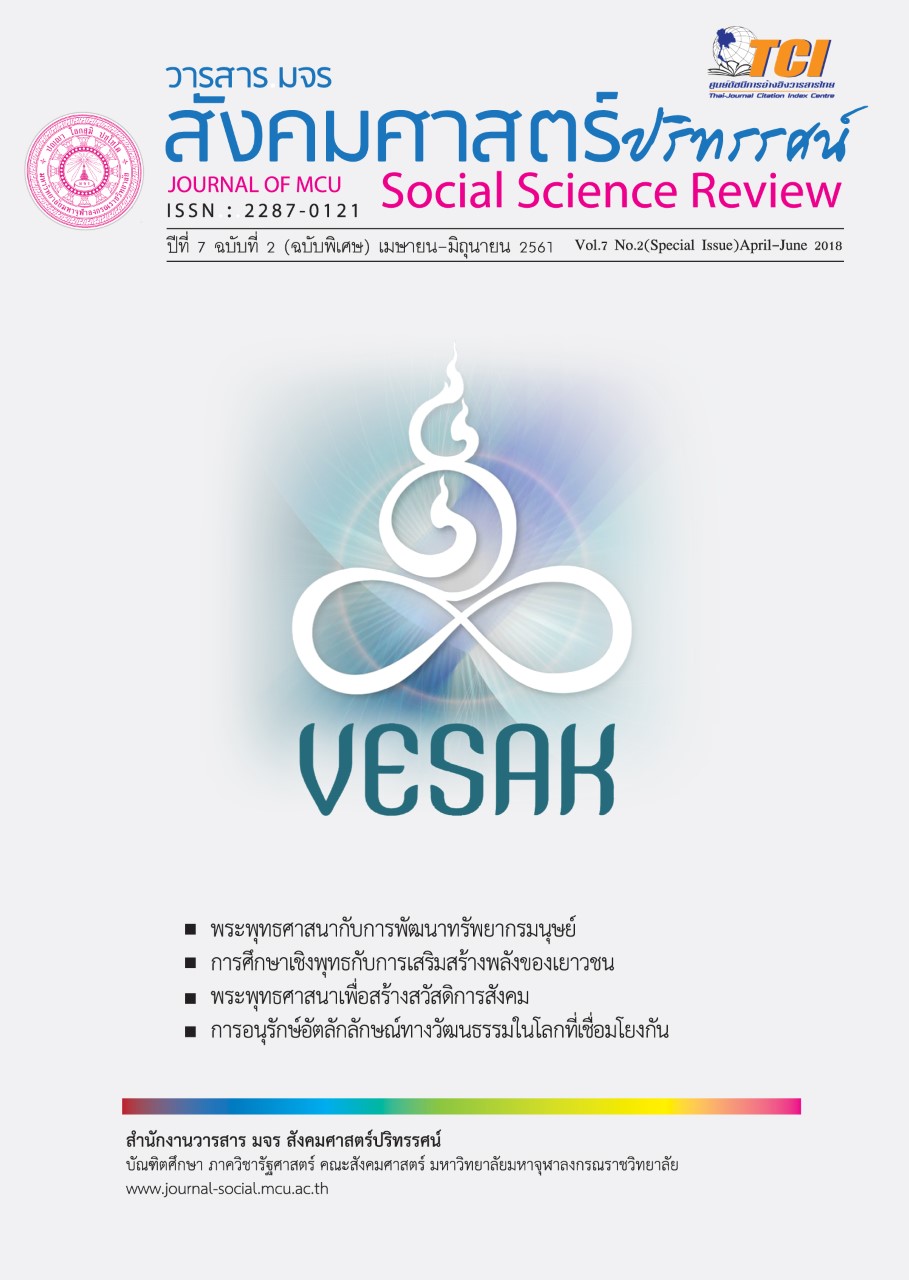การจัดการสินค้าชุมชนตามวิถีพุทธในจังหวัดกาญจนบุรี
คำสำคัญ:
การจัดการสินค้าชุมชนวิถีพุทธบทคัดย่อ
บทความวิจัยฉบับนี้มีวัตถุประสงค์คือ 1. เพื่อศึกษาสภาพทั่วไปของการจัดการสินค้าชุมชนในจังหวัดกาญจนบุรี 2. เพื่อศึกษาวิธีการจัดการสินค้าชุมชนให้เป็นตามวิถีพุทธ และ
3. เพื่อเสนอรูปแบบการจัดการสินค้าชุมชนตามวิถีพุทธในจังหวัดกาญจนบุรีการวิจัยครั้งนี้ใช้ระเบียบวิธีวิจัยเชิงคุณภาพ (QualitativeResearch) โดยทำการวิจัยเชิงเอกสาร (Documentary Analysis) กับการสัมภาษณ์เชิงลึก (In-depth Interview) จากผู้ให้ข้อมูลสำคัญ (Key Informants) ที่เป็นผู้ทรงคุณวุฒิ จำนวน 25 รูป/คน ทำการสนทนากลุ่มเฉพาะ (Focus Group Discussion) กับผู้เชี่ยวชาญ จำนวน 9 รูป/ท่าน
ผลการวิจัยพบว่า
1. สภาพทั่วไปของการจัดการสินค้าชุมชนในจังหวัดกาญจนบุรี พบว่า การจัดการสินค้าชุมชนตามหลักการบริหาร 4M คือ บุคลากร การเงิน วัสดุและอุปกรณ์ และการจัดการ หัวใจหลัก คือ บุคลากรที่เข้ามาทำหน้าที่ต่าง ๆ ทั้ง 4 ด้านนี้ เป็นหลักสำคัญของความสำเร็จในทุกมิติของการจัดการสินค้าชุมชนในจังหวัดกาญจนบุรี ด้านบุคลากร ในการทำงานให้ประสบความสำเร็จนั้น ความร่วมมือของบุคลากรเป็นสิ่งสำคัญมาก ดังนั้นการจัดการสินค้าชุมชนถ้ามีความตระหนักถึงความสำคัญของการพัฒนาบุคลากรในตำแหน่งหน้าที่ต่าง ๆ ขององค์กรนั้น ก็ควรที่จะมีการกำหนดแนวทางการพัฒนาบุคลากรไว้ในประเด็นยุทธศาสตร์ของแผนพัฒนาสินค้าชุมชน เพื่อการนำกลุ่มสินค้าชุมชนให้ขับเคลื่อนแบบองค์รวม ด้านการเงิน กลุ่มสินค้าชุมชน หรือ ธุรกิจย่อย ที่เป็นองค์ประกอบสำคัญของแต่ละสังคมด้วยสิ่งเล็ก ๆ เหล่านั้น มีความดีงาม ความพอดี เป็นหลักแฝงอยู่ และเมื่อกลุ่มสินค้าชุมชน หรือ ธุรกิจชุมชนขนาดเล็กมีแรงขับเคลื่อนไปข้างหน้าพร้อม ๆ กันนั้นหมายถึง การพัฒนาประเทศชาติด้วยความยั่งยืนด้านวัสดุและอุปกรณ์ การผลิตสินค้าชุมชนที่คำนึงถึงการประหยัดทรัพยากรธรรมชาติและช่วยรักษาสภาพแวดล้อม แนวคิดนี้สอดแทรกเข้ามาอยู่ในกลยุทธ์ทางการตลาด เนื่องจากในปัจจุบันตลาดโลกให้การตอบรับกับผลิตภัณฑ์ที่เป็นมิตรกับสิ่งแวดล้อม หรือ ผลิตภัณฑ์จากธรรมชาติเป็นอย่างมาก ด้านการจัดการ การใช้ภูมิปัญญาท้องถิ่น ภูมิปัญญาท้องถิ่น ไม่ว่าท้องถิ่นในเมืองหรือในชนบท จะมีบุคลากรที่มีความรู้ และประสบการณ์ที่สั่งสมกันต่อ ๆ มาสามารถช่วยแก้ปัญหาหรือเสนอแนะสิ่งที่ถูกต้อง เหมาะสมกว่าได้ในหลายเรื่อง ดังนั้น การยอมรับความคิดเห็นของผู้อื่น องค์คณะอื่น จะช่วยให้การทำงานสำเร็จได้โดยง่าย ทั้งนี้ เนื่องจากว่าองค์ความรู้ในท้องถิ่นนั้น เป็นความรู้ที่เกิดจากการปฏิบัติจริงที่สืบทอดกันมา
2. วิธีการจัดการสินค้าชุมชนให้เป็นตามวิถีพุทธ ด้านบุคลากร วางคนให้ถูกกับงาน มีปัญญา ต้องมีความอดทน อดกลั้น ขยัน มีความสามัคคี ความตั้งใจในการสร้างผลประโยชน์ให้กับกลุ่มสินค้าชุมชน ด้านการเงิน ความซื่อสัตย์ ความอดทน การเสียสละและแบ่งปัน ขยันหา รู้จักรักษา รักษาสัจจะ ติดตามผลการดำเนินงานของกลุ่มสินค้าชุมชน และบริหารจัดการเพื่อให้บรรลุเป้าหมายที่กลุ่มสินค้าชุมชนกำหนดไว้ ด้านวัสดุและอุปกรณ์ สามารถแลกเปลี่ยนข้อมูลและเสนอความคิดเห็นต่าง ๆ เพื่อแก้ปัญหาที่เกิดขึ้น และรู้จักประมาณในการใช้จ่ายทรัพย์ สามารถสร้างและรักษาสัมพันธ์ภาพที่ดีกับสมาชิกในทีมได้ ด้านการจัดการ รู้และเข้าใจถึงวิสัยทัศน์และเป้าหมายของกลุ่มสินค้าชุมชน เพื่อกำหนดบทบาทหน้าที่ของสมาชิกในทีมให้สามารถตอบสนองวิสัยทัศน์ของกลุ่มสินค้าชุมชน
3. รูปแบบการจัดการสินค้าชุมชนตามวิถีพุทธในจังหวัดกาญจนบุรี ตามหลัก
อิทธิบาท 4 ด้านบุคลากร ตามหลักฉันทะ ได้แก่ คนที่มีจิตสาธารณะสูงทำเพื่อส่วนรวมเป็นหลักตามหลักวิริยะ ได้แก่ ความสำนึกเรื่องความถูกต้องการตอบแทนชุมชน สังคม หลักจิตตะ ได้แก่ บุคคลที่พร้อมช่วยเหลือเกื้อกูลกันในกลุ่ม ตามหลักวิมังสา ได้แก่ บุคคลที่ทำงานละเอียดถี่ถ้วนปฏิบัติตามกฎระเบียบ ด้านการเงิน ตามหลักฉันทะ ได้แก่ จิตสำนึกในความสุจริต รู้จักและเข้าใจในบทบาทหน้าที่ของตน ตามหลักวิริยะ ได้แก่ ออมทรัพย์เพื่อการผลิตเก็บเงินทุกเดือน ตามหลักจิตตะ ได้แก่ การเสียสละและแบ่งปันซื่อสัตย์ ตามหลักวิมังสา ได้แก่ จัดทำบัญชีด้วยความละเอียดเรียบร้อยด้านวัสดุและอุปกรณ์ ตามหลักฉันทะ ได้แก่ ผลิตด้วยภูมิปัญญาท้องถิ่นเพื่อความเป็นเอกลักษณ์เฉพาะ ตามหลักวิริยะ ได้แก่ รักษาคุณภาพสินค้าให้สม่ำเสมอ ตามหลักจิตตะ ได้แก่ กลุ่มสินค้าชุมชนต้องรู้จักใช้ทรัพยากรให้คุ้มค่า ตามหลักวิมังสา ได้แก่ ไม่ผลิตสินค้าตามกระแส เพราะไม่มีความยั่งยืนในระยะยาว และด้านการจัดการ ตามหลักฉันทะ ได้แก่ สินค้าชุมชนผลประโยชน์เพื่อมาดูแลชุมชน ตามหลักวิริยะ ได้แก่ สร้างความสามัคคีในสมาชิกชุมชน ตามหลักจิตตะ ได้แก่ รู้ตน
รู้ประมาณ รู้หลักการตลาด ตามหลักวิมังสา ได้แก่ สามารถประเมินประสิทธิภาพการทำงานของกลุ่มสินค้าชุมชนโดยเปรียบเทียบ กับวิสัยทัศน์และเป้าหมายของกลุ่มสินค้าชุมชนได้อย่างต่อเนื่อง
เอกสารอ้างอิง
Mahachulalongkornrajavidyalaya University.(1992)Pali Tripitaka. The Rules
Reflect Mahachula Tepic.2500. Bangkok: Chulalongkorn University Printing College.
Provincial Community Development Office of Kanchanaburi. (2015). OTOP Report 2015(Report).Kanchanaburi: Community Development Department.
Sangha National Office of Buddhist.(2015). Sangha Manual. Bangkok: National Office of Buddhist.
Shan Takawicharna. (2007). Buddhist Human Resources Development. Public Administration.Ramkhamhaeng University.
SuyadaSoonthornsaratoon. (2009). A Cooperation Model of Hoem, Monastery School and Communityfor Building Cultural Immunity Children and Young People inthe Perimeter of Bangkok MethropolisCultural Immunity Promotion in the Suburban Bangkok Metropolis.Faculty of Cultural Science. Mahasarakham University.
ดาวน์โหลด
เผยแพร่แล้ว
รูปแบบการอ้างอิง
ฉบับ
ประเภทบทความ
สัญญาอนุญาต
ลิขสิทธิ์ (c) 2020 วารสาร มจร สังคมศาสตร์ปริทรรศน์

อนุญาตภายใต้เงื่อนไข Creative Commons Attribution-NonCommercial-NoDerivatives 4.0 International License.
เพื่อให้เป็นไปตามกฎหมายลิขสิทธิ์ ผู้นิพนธ์ทุกท่านต้องลงลายมือชื่อในแบบฟอร์มใบมอบลิขสิทธิ์บทความให้แก่วารสารฯ พร้อมกับบทความต้นฉบับที่ได้แก้ไขครั้งสุดท้าย นอกจากนี้ ผู้นิพนธ์ทุกท่านต้องยืนยันว่าบทความต้นฉบับที่ส่งมาตีพิมพ์นั้น ได้ส่งมาตีพิมพ์เฉพาะในวารสาร มจร สังคมศาสตร์ปริทรรศน์ เพียงแห่งเดียวเท่านั้น หากมีการใช้ภาพหรือตารางหรือเนื้อหาอื่นๆ ของผู้นิพนธ์อื่นที่ปรากฏในสิ่งตีพิมพ์อื่นมาแล้ว ผู้นิพนธ์ต้องขออนุญาตเจ้าของลิขสิทธิ์ก่อน พร้อมทั้งแสดงหนังสือที่ได้รับการยินยอมต่อบรรณาธิการ ก่อนที่บทความจะได้รับการตีพิมพ์ หากไม่เป็นไปตามข้อกำหนดเบื้องต้น ทางวารสารจะถอดบทความของท่านออกโดยไม่มีข้อยกเว้นใดๆ ทั้งสิ้น





